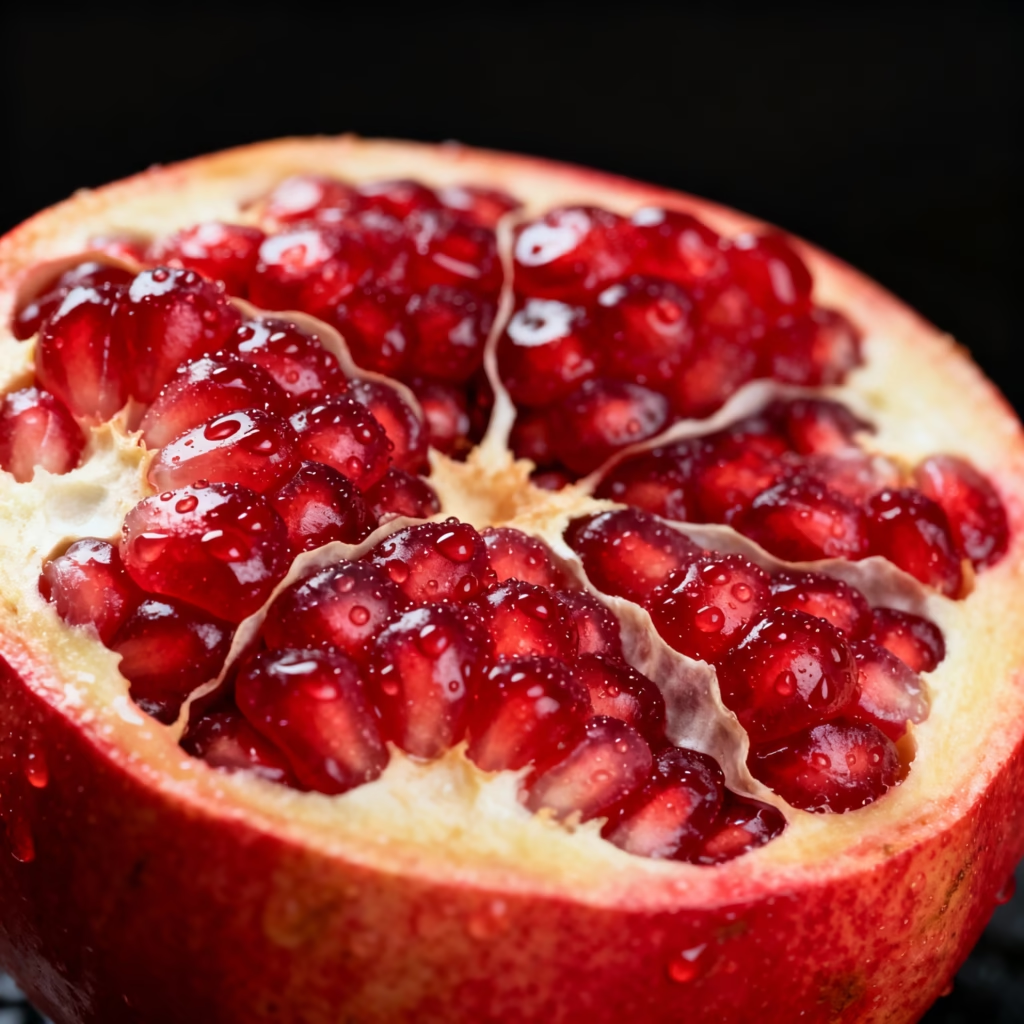Expert Explains What Happens When You Eat One Pomegranate Every Day
Pomegranates, often called the “jewel of fruits,” are celebrated worldwide for their gleaming ruby-red seeds and extraordinary nutritional richness. Beyond their eye-catching appeal, pomegranates hold immense health potential. This magnificent fruit is packed with antioxidants, vitamins, minerals, and dietary fibre – natural elements that contribute to total wellness. Many nutritionists now highlight pomegranate as one of the best fruits to include in a balanced daily diet for long-term vitality and disease prevention.
Health professionals and researchers continue to uncover new benefits of this powerful fruit. But what exactly happens when you eat one pomegranate every single day? How does it transform your body from the inside out?
To understand these effects, we consulted Pooja Singh, a leading Dietician at ShardaCare Health City, Noida, who explained in detail how daily pomegranate consumption influences heart health, digestion, skin, and more. Let’s explore what makes this fruit a daily superfood for maintaining overall wellbeing.
1. Boosts Heart Health Naturally
According to dietitian Pooja Singh, regular consumption of pomegranate is highly beneficial for cardiovascular health. This fruit contains potent antioxidants, especially punicalagin and polyphenols, which help protect the heart by neutralizing free radicals. These antioxidants reduce oxidative damage and inflammation—two major causes of heart disease.
Pomegranates can help lower blood pressure levels and improve blood circulation, promoting more efficient oxygen and nutrient delivery throughout the body. Several studies also suggest that drinking fresh pomegranate juice helps reduce arterial plaque buildup, supporting clear and healthy arteries. This process lowers the risk of strokes and heart attacks, making pomegranate an excellent natural supplement for heart protection.
Furthermore, punicalagin has been shown to improve endothelial function—the inner lining of blood vessels—enhancing their flexibility. Consuming one pomegranate daily can therefore help maintain a stable heartbeat, improve overall vascular health, and contribute to longevity.
For those already facing high cholesterol or minor cardiac symptoms, integrating fresh pomegranate seeds or juice into their routine can support recovery and disease management.
2. Enhances Digestion and Gut Health
Pomegranate is equally admired for its digestive benefits. A single fruit contains a substantial amount of dietary fibre, a crucial element for maintaining smooth digestion and bowel regularity. Fibre aids the body in efficiently breaking down food while preventing problems like constipation, bloating, and indigestion.
Beyond fibre content, pomegranates also act as a natural prebiotic, nourishing the beneficial bacteria in your gut. Balanced gut flora plays a vital role in nutrient absorption, immunity, and mental health.
The antioxidants and polyphenols found in pomegranate further contribute to a healthy digestive tract by reducing inflammation and improving the intestinal lining’s strength. Dietary fibre also helps regulate appetite, contributing indirectly to weight management.
Including one pomegranate every day can keep your digestive system active, clean, and balanced – preventing common issues that arise from processed or junk food consumption.
3. Strengthens the Immune System
One of the most significant advantages of consuming pomegranate daily lies in its ability to boost your immune system. The fruit is a rich source of vitamin C, one of the strongest immune-boosting nutrients known to mankind. Vitamin C enhances the production of white blood cells, which help defend your body against bacteria, viruses, and other pathogens.
Pomegranate also contains natural antimicrobial and antiviral compounds, offering a layer of protection against seasonal infections such as colds, flu, and sore throats. The fruit’s powerful antioxidants further eliminate harmful free radicals that weaken immunity over time.
Dietitian Pooja Singh emphasizes that regular intake keeps your immune defence system active throughout the year. Whether eaten fresh or consumed as juice, this fruit can help fight off common illnesses and keep energy levels stable – making it particularly beneficial during changing weather or flu season.
For children and older adults, pomegranate consumption helps maintain consistent immune strength without relying excessively on synthetic supplements.
4. Improves Skin Health and Slows Ageing
Beauty begins from within, and pomegranate proves this perfectly. Pomegranates are loaded with antioxidants such as anthocyanins, tannins, and flavonoids that help combat oxidative stress—a major trigger for premature ageing.
By neutralizing free radicals, these antioxidants minimize signs of ageing like wrinkles, fine lines, dull skin, and pigmentation. The fruit also encourages collagen production, helping maintain youthful and firm skin texture. Vitamin C in pomegranate supports skin repair and provides a natural glow.
Consuming one pomegranate daily supplies your skin with the nourishment it needs to regenerate cells faster, building resilience against UV radiation and pollution-related damage.
Moreover, pomegranate’s compounds improve blood circulation, ensuring better oxygen supply to skin tissues. Some dermatologists even recommend pomegranate extract for patients experiencing dry or uneven skin tone. Over time, regular consumption leaves your complexion radiant, hydrated, and visibly younger.
For best results, blend pomegranate seeds into smoothies or use juice as a natural toner occasionally—it works both internally and externally.

5. Regulates Blood Sugar Levels
Despite its sweetness, pomegranate offers an impressive low glycemic index (GI). This means it releases sugar into the bloodstream gradually, maintaining stable glucose levels. For people with diabetes or those vulnerable to insulin resistance, daily pomegranate consumption can be extremely beneficial.
The polyphenols present in pomegranate improve insulin sensitivity, allowing your cells to use glucose more efficiently. This process prevents sudden spikes or crashes in blood sugar that often lead to fatigue or increased appetite.
Scientific evidence also shows that pomegranate extract may help protect pancreatic cells that produce insulin from inflammatory damage. As a result, it becomes an ideal addition to a diabetic-friendly meal plan.
If you’re monitoring your sugar levels, pairing pomegranate with other low-carb fruits ensures balanced nutrition without compromising sweet cravings. It is a great natural option compared to processed desserts or juices containing added sugars.
6. Supports Brain Function and Memory
Your brain can significantly benefit from a daily dose of pomegranate. The antioxidants, mainly polyphenols and flavonoids, protect brain cells from oxidative stress and inflammation, preserving cognitive function.
Studies have revealed that pomegranate intake can help enhance memory, focus, and learning abilities. It may even assist in slowing down the progression of neurodegenerative diseases such as Alzheimer’s and Parkinson’s.
The high antioxidant capacity shields neurons from damage caused by toxins, helping preserve mental clarity. Additionally, the fruit improves blood flow to the brain, ensuring optimal nutrient and oxygen delivery.
For students, professionals, and older adults alike, eating pomegranate regularly supports healthy brain function. It fuels concentration and overall mental endurance, turning this humble fruit into a superfood for your mind.
7. Aids in Weight Management
If you’re planning to lose or maintain weight naturally, pomegranate can be your ally. This fruit is low in calories, yet high in fibre, making it an ideal snack between meals. The fibre content keeps you feeling full for longer, reducing frequent snacking and overeating tendencies.
Pomegranate’s antioxidants accelerate metabolism, assisting your body in burning fat more efficiently. When combined with a clean diet and regular exercise, daily intake supports healthy weight management and energy balance.
Pooja Singh notes that pomegranate’s nutrients also help reduce water retention and bloating, often mistaken for weight gain. Eating one fruit daily gives a natural feeling of satiety while delivering energy without excess calories.
Those following intermittent fasting or calorie-restricted diets can consume pomegranate as a satisfying and nutrient-rich snack, ensuring they stay nourished despite controlled intake.
8. Enhances Exercise Performance and Recovery
Athletes and fitness lovers can gain massively from daily pomegranate consumption. Research indicates that this fruit’s anti-inflammatory and antioxidant properties help reduce muscle soreness and accelerate recovery after intense workouts.
The natural nitrate content in pomegranate improves blood flow and oxygen utilization, enhancing endurance levels during physical activity. Its rich blend of minerals replenishes electrolytes lost in sweat, preventing fatigue or cramps.
Studies found that pomegranate juice could reduce oxidative damage caused by vigorous exercise, supporting quick tissue repair. It’s not only effective before workouts for energy production but also post-exercise for faster recovery.
Adding a glass of pomegranate juice or mixing seeds into a protein shake post-workout maximizes performance and long-term muscle health.
9. Promotes Hormonal Balance
Beyond physical health, pomegranate can aid hormonal regulation, especially in women. The fruit contains plant-based estrogens (phytoestrogens) that balance hormone levels during menstruation and menopause.
Regular intake can reduce symptoms like mood swings, cramps, and fatigue associated with hormonal fluctuations. Additionally, its antioxidants support reproductive health by improving blood supply to vital organs.
Men can also benefit, as pomegranate consumption has been linked to enhanced testosterone levels and better fertility markers. Daily intake thus contributes to balanced hormonal activity and overall vitality for both genders.
10. Protects Against Certain Cancers
While research is ongoing, preliminary studies suggest that pomegranate may help reduce the risk of certain cancers, including breast, prostate, and colon cancer.
Punicalagin and ellagic acid—two powerful compounds found in pomegranate—show anti-tumour properties by inhibiting cancer cell growth and preventing them from spreading. The fruit’s rich antioxidant concentration limits DNA damage caused by free radicals, a primary trigger for cancer development.
Though not a substitute for medical treatment, including pomegranate in daily nutrition adds an extra layer of protection in a health-conscious lifestyle.
11. Helps in Managing Inflammation
Chronic inflammation can lead to severe conditions like arthritis, obesity, and heart disease. Pomegranate contains anti-inflammatory agents that counteract internal swelling and tissue irritation.
Regular consumption helps soothe joint pain and muscle stiffness, commonly associated with inflammatory disorders. Patients with arthritis often report relief after introducing pomegranate juice into their routine thanks to its naturally calming polyphenols.
These anti-inflammatory compounds also help reduce oxidative stress, maintaining energy and mobility in older adults.

12. Improves Oral Health
Dental hygiene often gets overlooked, but pomegranate contributes significantly here too. Known for its natural antibacterial effects, pomegranate can help combat plaque formation, gum disease, and bad breath.
Its polyphenols hinder the growth of harmful bacteria in the mouth, promoting overall oral hygiene. Including pomegranate juice or extract in daily dental care helps protect gums and teeth naturally.
While not a direct replacement for brushing, eating pomegranate regularly creates a healthier oral environment.
13. How to Incorporate Pomegranate into Your Diet
There are multiple delicious and creative ways to enjoy pomegranate daily. Here are some popular and healthy methods:
-
Eat the seeds raw as a nutritious snack.
-
Sprinkle them over salads or yogurt for a crunchy twist.
-
Blend them in smoothies or juicing recipes for refreshing taste.
-
Add them to oatmeal, desserts, or fruit bowls for extra flavor.
-
Include pomegranate juice in post-workout recovery drinks.
For maximum benefits, opt for freshly peeled seeds over packaged juices, as processed variants may contain added sugars.
Expert Diet Tip
Pooja Singh advises consuming one medium-sized pomegranate daily, preferably in the morning or mid-day. This timing enhances absorption and energy utilization. Always wash the fruit thoroughly and consume it with minimal seasoning to retain its natural nutrients.
If you’re diabetic or hypertensive, consult your dietitian before making pomegranate a routine part of your meal plan. While generally safe, portion control ensures balanced nutrient intake.
Bottom Line
Incorporating pomegranate into your daily diet can genuinely transform your health. From boosting heart health and improving digestion to rejuvenating skin and enhancing brain performance, this superfruit stands as one of the best natural allies for a healthy lifestyle.
Its impressive combination of antioxidants, vitamins, minerals, and fibre makes it perfect for strengthening immunity and preventing premature ageing. Whether you eat it raw, blend it in smoothies, or drink fresh juice, pomegranate’s benefits are undeniable.
So, the next time you’re thinking of a nutrient-rich addition to your meals, choose the vibrant pomegranate – one of nature’s most delicious gifts for long-lasting vitality.
for more news VISIT BB

